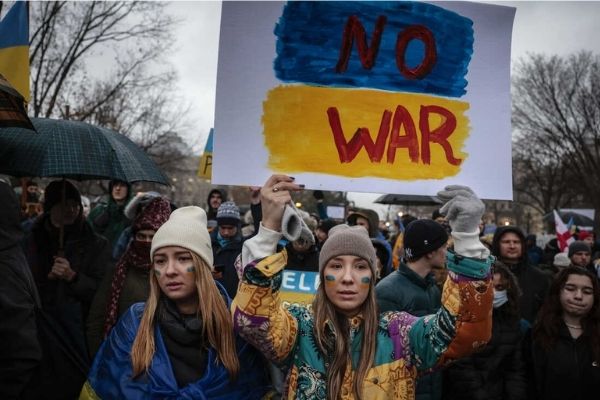This week marks the passing of one year since Ukraine was invaded by Russian forces. With no end in sight, Ukraine is struggling with destruction, the deaths of tens of thousands of people and the exile of nearly five million.

On 24 February 2022, early in the morning, the first explosions were heard in Kiev, the capital of Ukraine, and the biggest war in Europe since the Second World War has thus begun. The invasion is still described by Russian President Vladimir Putin as a “Special Military Operation”, which he defends as an attempt to “cleanse Ukraine of weapons and Nazis.”
In his anniversary address, Zelensky called last February 24 “the most difficult day in our recent history. We woke up early and haven’t slept since.” The past 365 days, he said, were “a year of resilience. Year of courage. A year of pain. A year of hope. A year of aging. A year of unity. The year of invincibility.” As the war enters its second year, the Ukrainian president said that “our victory is inevitable. It is close. It will happen.”
“Russia’s invasion is an affront to our collective conscience”
UN chief António Guterres has described Russia’s invasion of Ukraine as “an affront to our collective conscience” and “a violation of international law.”
The Secretary General’s words marked the start of a debate at an emergency special session of the UN General Assembly aimed at getting a broad support for “a just and lasting peace” resolution.
“The one-year mark of Russia’s invasion of Ukraine stands as a grim milestone — for the people of Ukraine and for the international community. That invasion is an affront to our collective conscience… And the impact is being felt far beyond Ukraine,” Guterres told the assembly.
Guterres said the UN’s position was “unequivocal” in supporting the Charter’s principles. “We are committed to the sovereignty, independence, unity and territorial integrity of Ukraine, within its internationally recognised borders.”
The war by the numbers
One year after Russia launched its full-scale invasion of Ukraine, the conflict continues to take a terrible toll.
According to the European Union’s justice commissioner, 65,000 suspected war crimes have been reported since Russia launched its invasion of Ukraine. In December, an adviser to Ukrainian President Volodymyr Zelensky said as many as 13,000 Ukrainian troops had been killed since the start of the war.
United Nations data show that since the start of the war, more than 7,199 Ukrainian civilians have been killed and 11,756 have been injured, with most casualties caused by explosive weapons. The U.N. acknowledges that the real number of casualties is likely much higher, because information is difficult to obtain from areas where there’s heavy fighting.
More than 13 million people remain uprooted from their homes, including nearly 8 million refugees across Europe and more than 5 million internally displaced people within Ukraine. Their prospects for return in the near future, however, are clouded by continued hostilities, insecurity and destruction in their home regions, according to two new reports released by UNHCR, the UN Refugee Agency. The impacts on people’s mental health, whether they are inside or outside of Ukraine, continue to grow.
“The human suffering and hardship that has been caused by the war is beyond comprehension. With a third of Ukraine’s population forced to flee their homes, the situation remains unpredictable. We must continue to respond to the needs of the displaced and ensure their safety until they can return home,” said Pascale Moreau, UNHCR’s Regional Director for Europe.
At least 6,000 Ukrainian children have been taken to camps and other facilities in Russia and Russian-occupied territory since the invasion began, prevented from communicating with their families and subjected to pro-Russian re-education, according to a recent report from the Conflict Observatory, a research group that monitors alleged Russian war crimes in Ukraine.
Sources: Le Monde, Euronews, CBS News

